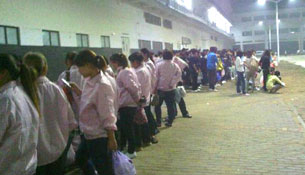China: More unrest at Foxconn
| Publisher | Radio Free Asia |
| Publication Date | 8 October 2012 |
| Cite as | Radio Free Asia, China: More unrest at Foxconn, 8 October 2012, available at: https://www.refworld.org/docid/50879ed2c.html [accessed 1 June 2023] |
| Disclaimer | This is not a UNHCR publication. UNHCR is not responsible for, nor does it necessarily endorse, its content. Any views expressed are solely those of the author or publisher and do not necessarily reflect those of UNHCR, the United Nations or its Member States. |
2012-10-08
The Chinese electronics maker denies that 'disputes' led to large-scale strike.
 An undated photo shows workers at the Foxconn plant in Zhengzhou. Photo courtesy of China Labor Watch
An undated photo shows workers at the Foxconn plant in Zhengzhou. Photo courtesy of China Labor Watch
A Taiwan-owned company that manufactures Apple's iPhones in China has denied reports from a U.S.-based labor rights group of a strike by thousands of workers at its plant in the central city of Zhengzhou last week, although it said "disputes" at the plant had now been resolved.
The New York-based group China Labor Watch said in a recent report on its website that 3,000 to 4,000 workers walked out of the factory on Friday afternoon, angered by stricter quality-control demands for Apple's iPhone 5 assembly line and not being permitted to take vacations during the week-long National Day holiday.
But Foxconn denied the report of a large-scale strike on Saturday, saying the plant suffered only two brief and small disputes on Oct. 1 and 2.
"Any reports that there has been an employee strike are inaccurate. There has been no workplace stoppage in that facility or any other Foxconn facility and production has continued on schedule," the company said in an emailed statement on Saturday.
Foxconn said fights reported by the group had taken place several days earlier, and were "isolated incidents." It said it had provided "additional staff for the lines in question."
However, employees at the Zhengzhou facility said the reported large-scale strike had occurred.
"There were about 4,000 to 5,000 people," said an employee at the factory surnamed Jiang.
An employee who answered the phone at the Foxconn Zhengzhou factory also said there had been a strike.
"Yes, there was," the employee said, when asked to confirm the reports of a strike at the factory on Friday, adding that the strike was now over.
An employee surnamed Zhang said he believed the strike had been prompted by anger over long working hours.
"The working day is too long," he said. "You can be standing there for the whole day, and if it's like that every day, it's unbearable."
Zhang said a typical working day at Foxconn could last 12 hours, including time for meals, and workers typically earned a salary of 2,000 yuan (U.S. $317) per month when they had just started at the plant.
Regarding the reported clashes, he said: "There are clashes every day."
Quality control
Meanwhile, a recruitment agent for Foxconn in Zhengzhou surnamed Qian linked the unrest to quality control issues on the production lines.
"The management raised the quality control standards, and the workers were unhappy about this, because they thought they were too strict," Qian said. "The original dispute involved about 20 people, and then many more people started to gather round and watch because they saw people fighting."
"This went on for a while, but it didn't affect production. It was resolved after mediation," Qian said.
And an employee surnamed Wang also said it was common for workers to be expected to put in large amounts of overtime at the Zhengzhou factory.
"When we are working overtime, we can work 80 hours [a week], and sometimes we work 100 hours," he said.
According to China Labor Watch, the strike began at around 1:00 p.m. local time on Friday, and ended at 11:00 p.m. the same day, and mainly involved workers from assembly lines and quality-control inspectors.
"Foxconn raised overly-strict demands on product quality without providing worker training for the corresponding skills. This led to workers turning out products that did not meet standards, and ultimately put a tremendous amount of pressure on workers," the group said.
The organization said Apple pressed ahead with production demands despite design problems. The new quality demands included "indentation standards of 0.02 mm and demands related to scratches on frames and back covers" of phones, China Labor Watch said.
"This strike is a result of the fact that these workers just have too much pressure," said Li Qiang, China Labor Watch's executive director.
Foxconn said in its statement that employees who worked during the National Day holiday did so voluntarily and were paid three times their usual hourly compensation, as demanded by law.
Last month, riot police were called out to stem unrest involving around 2,000 workers at Foxconn's plant in the northern city of Taiyuan, in which at least 40 people were injured. Unconfirmed reports later denied by the company said between seven and 10 people had died.
The unrest at Foxconn, which is the world's largest contract maker of electronic goods, came after a series of labor incidents at the company's factories, including a string of worker suicides last year.
The company has been slammed for poor working conditions and mistreatment of employees at its China facilities, but says it has spent heavily in recent months to improve conditions and to raise wages.
While the company has said it is currently investigating the cause of the violence, online comments have blamed brutality on the part of the factory's own security guards.
Foxconn Technology Group is the world's largest producer of computer components. It assembles products for electronics brand names like Apple, Sony, Intel and Nokia, and employs about one million workers in China.
Reported by Xin Yu for RFA's Mandarin service, and by Grace Kei Lai-see for the Cantonese service. Translated and written in English by Luisetta Mudie.
Link to original story on RFA website
